Next-Level Roofing Starts with Elevate - PODCAST TRANSCRIPT
September 15, 2025 at 10:00 a.m.Editor's note: The following is the transcript of a live interview with Frank Palmer and Emma Nealy from Elevate. You can read the interview below, listen to the podcast or watch the recording.
Intro: Good afternoon. Good morning to some of you on the West Coast. My name is Heidi Ellsworth and this is the RLW from RoofersCoffeeShop. Thank you so much for being here today. I tell you what, we have a very special day. We are with the experts from Elevate and we're going to be talking about next-level roofing. A quick couple of housekeeping. Of course, this is being recorded and it will be available within 24 to 48 hours. Also, we want to hear what you have to say. The chat is open, so please let us know who you are, where you're coming from, what kind of business you have. We will be chatting and taking questions throughout the entire webinar today, so please get active there. Let's get started.
This is really an exciting day, for me, personally, because I get to be with two folks who I have looked up to for a very long time, are experts in commercial roofing and really bring the trends and what is happening. The first person I am excited to introduce is Frank Palmer, who I've worked with for many years, off and on. Frank, welcome to the RLW this month.
Frank Palmer: Heidi, we finally made it.
Heidi Ellsworth: We finally made it. I'm so excited to have you on here.
Frank Palmer: I was deliberately being elusive.
Heidi Ellsworth: I know. I would even say may have ghosted me a couple times, yeah. But no, we've got you. Because everybody wants to hear what you have to say, Frank. Let's start with an introduction. Tell us who you are, what you do. Give us a little bit of history.
Frank Palmer: My name is Frank Palmer, as you mentioned and I am the senior vice president of Elevate roof systems. I've been with the Elevate company for almost about 18 months now and I've been in the roofing business, I want to say, over 30 years. I cut my teeth in roofing with a little EPS motor in Salt Lake City called Advanced Foam Plastics and I learned about tapered roofing insulation. I thought, when I got out of college, I was going to be working for a ski company and ultimately got into roofing. And the cool thing about it though, it's a great business. I went from Advanced Foam Plastics to one of my largest customers, which was the Carlisle companies and wound up becoming a region manager for the Versico brand out west. And that's kind of where we met-
Heidi Ellsworth: That's where we met, yeah-
Frank Palmer: And I was responsible for-
Heidi Ellsworth: ... and worked together.
Frank Palmer: Yeah. I was responsible for developing the Versico brand, I want to say, in 2003 to about 2011. And then I had an opportunity to become the general manager of Versico in 2011, moved to Carlisle PA and I was the general manager for a few years. Around 2019, I became the director of sales for Carlisle SynTec. Then the pandemic hit and there was a lot of change in the industry and one of my customers asked me to come work for them. And the opportunity was right. I went to SRS Distribution and helped SRS kind of round out their commercial operations. We opened up quite a few commercial distribution specialist locations, which is the hallmark of their commercial initiative. And in that process, that's where I met the Elevate folks. I think my skillset is more on the manufacturing side than the distribution side. I had an opportunity to come over to Elevate and become the vice president of sales and that's where I've been now.
Heidi Ellsworth: I tell you what, Frank, it is so fun to hear that history. And to have watched you, to worked with you, to mentored with you, it is just so cool to have you here today, finally. Yes, we're going to hear some trends here in just a minute. But first, I want to introduce another longtime friend and expert in the industry and that is Emma Nealy. Emma, welcome to the show.
Emma Nealy: Thank you, Heidi.
Heidi Ellsworth: I would love for you to introduce yourself, give us a little bit of your history and what you're doing at Elevate.
Emma Nealy: Yeah. So Emma Nealy, director of sales enablement for Amrize, really focused on the Elevate and the GenFlex brands and just celebrated my one year anniversary here with the company. Previously, spent the last 12 or so years with Carlisle Construction Materials, so started off working in the corporate office. And a couple years through that, Frank actually gave me the opportunity to come work for him at Versico. I would say I was grossly under qualified for that role, but learned a lot really with working with our sales channel. I would say before I stepped into that role, I had no idea what a manufacturer sales rep did, the responsibilities that they carried and really what the industry really needed from a manufacturer. So that really helped evolve kind of what I did for the Versico brand.
And then little over a year ago, Frank presented me with an opportunity to come join him over at Elevate and joined the team. And now, really responsible for helping our sales channel understand, sell our products, get with our customers, spend a lot of time in the field. But it's an industry I love. They always say, "Once you're in this industry, you can't get out," and I think that's true. I can't ever imagine myself doing anything different, industry-wise. I'm really enjoying my time here.
Heidi Ellsworth: I love it. Emma, you and I have both served on the IRE advisory board. We've been involved in a lot of different things. I'm just really excited to have you here today, so thank you so much.
Emma Nealy: Thank you.
Heidi Ellsworth: Thank you. So let's start out. I do want to remind everybody that the chat is open, so please let us know what you've got going there and who you are. Let us know where you're from, what kind of business do you have, commercial, residential. We love that. And be open to ask questions throughout this presentation. Okay. Frank, let's start out, because I just always think it's really good to kind of get our finger on the pulse of what's happening in the industry. Can you kind of give us a little bit of the state of commercial roofing right now and what you're seeing?
Frank Palmer: Well, yes, I can. I think first and foremost, I can't say this enough and we're grateful, we should be grateful to be part of one of the greatest industries in construction, let alone in commerce in general. The roofing industry, it's huge, but it's a relatively small community made up of really cool people. I just wanted to put that out there that we've got a really strong, small but large industry and I love being in it. With respect to current conditions, I think when you look at current conditions, we got to look at in context of how the year has unfolded, as how the year started off with the industry. I think if you go back to January, February, there was a lot of economic enthusiasm that was building up in the end of last year. Coming into the beginning of this year, there was an expectation, interest rates would be easing, contractor backlogs appeared to be strong.
And then when the tariff environment kind of struck us around Q2, that changed some of the momentum with some of the large new construction starts. But I think we're still in a great environment. Perhaps not as robust as we expected back in Q1, but the cool thing is the fundamentals are still evident. And I think in current conditions, we're still in a pretty strong industry.
Heidi Ellsworth: Love it. You know what? I've been hearing the same thing, that there are backlogs out there, that the contractors who are really focused and kind of rolling. I mean, a lot of us have experience going through these economic times, but there's still a lot of demand. I know our biggest problem and one that we've had for many years, but maybe we just haven't talked about as much, is the labor shortages. What are you seeing out there around that?
Frank Palmer: Everyone's aware of it. The challenges affect all industries. In particular, it seems to affect the trades more or at least it seems like the trades take the brunt of the shortages, because we're a hands-on business and you need people to install our products. I think the trade challenges, they're beyond our industry. But there's immigration challenges that go along with it, that could offset it. But one solution that I think, at least, can offset it is... The Roofing Alliance is working on trying to get some of our youngsters in the industry earlier, that can have some positive impact. But another offset, at least for the manufacturers, our challenge is to create labor-saving products to reduce install time and just to be part of a small offset. But in general, the labor shortages, there's no quick down-and-dirty solution. But the good news and bad news, we're not the only ones affected by it.
Heidi Ellsworth: It's true. It's the construction industry overall. But what I love and we're going to talk about this a little bit later on in the hour, is that manufacturers... At one point, I think a lot of people were thinking, "Well, it's just a contractor problem," but everyone realizes that's not the case. It is manufacturers are coming to the table with labor-saving solutions. When you really look at those kinds of solutions, you look at what we're dealing with right now, Frank, on extreme weather. Whether it's extreme weather, which is driving business or not, but the other side of it is just the products and how important they are to be able to resist and help against fire, wind, hurricane, hail, as seen there.
Frank Palmer: Well, the weather dictates our business and the good and bad of what we do. Our job is to develop products that can withstand Mother Nature for long periods of time. For example, you look at the hail, hail is a common product or a common phenomena that damages buildings. At one time, hail was only really known in the Midwest, in the hail zone or the hail belt. Now that zone has expanded beyond that traditional footprint and now it has a new designation, very severe hail ratings. So it tells us that the storms are getting larger in intensity and in size as well. Our job, again, is we build systems to counteract the storms and that kind of keeps us going with innovation.
Heidi Ellsworth: Yeah, it is. I think it is. I think weather has definitely been driving innovation. That and labor shortage, those are the two main topics and that really is what brings that together. Emma, I know you're out in the field a lot. Just like you said earlier, you're visiting with contractors. What are some of the industry outlooks or things that you're seeing?
Emma Nealy: Yeah. A lot of what Frank said holds true across the board. And I know you alluded, "We'll talk about this a little bit later," but even our industry partnerships, being associated with NRCA, visiting our customers and other organizations, it really allows us to be able to understand what our contractors, what our distributors, what architects are seeing out in the market so that we can also plan accordingly as well, in addition to really educating our customers. I think one thing that we've really tried to get in front of is share the information that we have with our customers, so understanding just the importance of communicating what we know to our customer base. So monthly, in our Elevate communications, we do include an industry update to our customers. But I would say even just understanding the industry, when we're out in the field visiting our customers, one of the questions we're always asking is, "How's business? What are you hearing? How can we help?" And this allows us to not only just draw our own conclusions, but really to help us plan and help our customers plan as well.
Heidi Ellsworth: Yeah. Isn't that the question, "How's business? How's the weather?" Those are the two questions that you always kind of start every conversation out with. I really love the collaboration part, Emma, what you just said, because I think that is one of the things I've kind of seen change in the industry over the last couple of decades. I don't know if it's just easier to communicate now, but there is a real collaboration on talking about, "How can we help some of these big problems?" and it really is around that commitment to innovation. So Frank, I would love it if you could talk about where you're at in Elevate and this commitment looking to the future and finding innovative solutions for some of the problems we're talking about.
Frank Palmer: I think when anyone innovates, you want to solve problems. And we're trying to solve problems, whether it's based on performance, performance of our products or it could be customer related. As I mentioned moments ago, the weather dictates our business. So we want to create products that can repel the elements and repel the elements for longer periods of time and be more resilient. But more importantly, the other factor is our customer, "How do we make the product easier for our customer to install our systems?" We get a lot of feedback from our customers. We get a lot of feedback from when we do leak repairs or when we're doing job startups. We learned different things about how our customers interact with our products and that's usually the beginning of some of our innovation ideas.
Heidi Ellsworth: I think that it is one of the things I've kind of learned through my career too, Frank and I'm even going to go to Eagle View, it was contractor driven. Right? Contractors, even though they didn't really know the technologies or what's going on, they're saying, "These are our problems." They're finding the partnerships, like with Elevate, to really find those solutions. And you don't always see that, but I think it leads to true performance. Maybe you can talk just a little bit about that, that it's not just innovation, it has to perform and how do you get there.
Frank Palmer: Well, you can come up with an idea and everybody's got a great idea, how do you commercialize the idea. You do a prototype, you have a contractor try it out, bend it, break it, twist it, destroy it. And if it withstands some of the trials and tribulations that our contractors can put it through, then we figure out how we're going to commercialize it. But it's got to perform. The challenge is it might perform in a lab, but it won't perform out in the elements. And there are two different things. When you develop products, it takes a while because we're going to put samples out into the marketplace for a year or two or three just to see how they behave in different climates. Because creating a product and putting it up in Seattle as opposed to South Florida are two different environments. We want to make sure when we do develop products, we put it all across the geography so we can have real world conditions. And then once it proves those tests, then we commercialize it.
Heidi Ellsworth: Yeah. Really looking at where you're at with Amrize and the vast network of innovation that you have and we actually are going to have a coffee conversations later in the year talking about all the different elements of Amrize, but that's a powerhouse right there what you can do with innovation. Talk to us a little bit about that.
Frank Palmer: Now that we're Amrize... and we're a US based company. The cool thing about being with Amrize now, we have our counterparts on the building materials side. We're on the building envelope side. And the folks on the building materials side, they're in aggregates, cements and ready-mix. So they're developing the parts of the building that we don't get to see for months and months and months later and they've got really cool innovation. They've got carbon-reduced concrete that talks about a nice environmental system that ties into what we do with environmental or sustainable products. Now that we're one company, we're starting to innovate together and we're starting the conversations. Because, again, these folks see projects and some of the challenges of projects, I want to say, a year, almost a year and a half ahead of us. So now that we're starting to meet together and starting to talk about these projects, how can we together go solve problems for some big customers rather than us coming to the project well after they're gone.
Heidi Ellsworth: Yeah. It seems like, now with the technologies that are out there, with everything that's happening, now's the time for that innovation.
Frank Palmer: Yes.
Heidi Ellsworth: I think contractors need to be ready for that and realizing that there's going to be a lot of changes and new stuff coming along. Emma, if you wouldn't mind, I know you do this day in and day out, but can you talk a little bit about that new product research? How does this work and how can contractors have this confidence in these new products that they're going to be seeing?
Emma Nealy: Sure. Ideally, in an ideal state and maybe this is what some of our contractors would hope at times, we'd love to have a new product idea and then roll it out the next day. But at the end of the day, we have to do our due diligence and testing and make sure that these products will perform for years and years to come. So when we look at all of the different new product ideas, trying to prioritize what's going to be the most impactful for our customers, for the market, for future trends that we're seeing and then it really just goes back to the resources that we have with Amrize. We are code driven. We want to make sure that it's tested, that it's proven out and that we're confident that we're going to be able to warrant it as well for, again, 5 to 30 years based on what our building owners need. And really just making sure that it's going to be compatible with the systems that our contractors are already installing.
So in saying that, the new product development process might be a little bit slower than what some would like. But knowing that it's slower, it's because we want to be confident in the products that we're rolling out. We have a lot of new products that we've rolled out in the last year, that I'm excited to talk about in just a little bit, that we've done just that.
Heidi Ellsworth: I think it's so important. And Frank, you and I have been involved in many product launches over the years. There's nothing I think more important than really sticking to this. Can you talk a little bit about how contractors are bringing this new products and understanding system compatibility and how it fits into their business?
Frank Palmer: When we develop a product, we want to solve a problem. What we don't want to do is create a problem to solve, because I think our customers will see right through that. But if we're going to create a product or a problem to solve, again, we rely on our customers to tell us what the challenges are. And whatever we create, it's got to last. If it doesn't last, that takes the confidence away from us launching new products. So I think listening to our customers, making sure we get the right feedback on how we make tweaks to our products is important.
Heidi Ellsworth: I think so too. I think nothing more important, listening to the customer, how you communicate with that customer. Okay, let's get into it. I'm excited. Let's talk about some of these new products. Emma, start us out with MAX PVC.
Emma Nealy: Sure. You just said it, listening to our customers. Simply put, PVC is a big segment now of the commercial roofing business. If you and I were having this conversation 10, 15 years ago, we probably wouldn't be talking much about PVC. We'd be talking about EPDM or TPO or asphalt, which are all still segments of the business that Elevate participates in. But PVC, over the past decade, has really grown in the number of installations and specifications that we're seeing in the market. When you look at building types, historically, the restaurants, the gas stations, the airports, those are the ones that we've always talked about PVC being a perfect fit for. But the big thing now is data centers. Data centers have really taken off. I mean, they're getting attention everywhere. Anytime you're reading anything about the construction industry, data centers always have some sort of line item there. And these buildings are really requiring some robust roofing assemblies.
So when we're talking with our contractor base and our sales representatives, their need was not only for a PVC membrane, but what type of PVC membrane can we put out in the market, that's really this premium membrane, to allow them to win business for these types of installations. So Elevate introduced MAX PVC this past October. And the MAX PVC membrane, it has an extra thickness over scrim and has industry-leading resistance to puncture, to breaking, to tearing and it also warrants up to 30 years. This really allows us to do a lot of cool things with it. But on top of that, with introducing MAX PVC, we rolled out some new accessories. This is kind of one that I think is not as well known, but this vinyl PVC rib, it actually allows the look of a standing seam roof system with a PVC membrane. So a lot of different things with that. The MAX PVC offering, we have a standard PVC offering, but we also have MAX PVC XR. XR is Elevate's fleece-back system.
So if you're not familiar with fleece-back membranes, it's that Cadillac roofing system. It's going to have that fleece backing, that's extra hail, extra wind uplift resistance, all of those types of things. But I also think and I'll talk about this next, an added benefit when you're using MAX PVC XR or any XR fleece-back membrane, you can use Twin Jet Ys. This is your low-rise foam adhesive, but you can use it for both the insulation and the membrane attachment. So rather than having a separate insulation adhesive and a separate bonding adhesive, you can have just one single adhesive for the whole thing. Some nerdy stuff about MAX PVC, the scrim is an 18 by 9 thread per inch scrim. So when we're talking about our research and development, scientists, they're way smarter than me, I've realized that having this type of weft insertion really helps increase that strength and tear resistance. So it goes back to how can we leverage products to help our contractors and our sales reps when jobs sell more products and this was the solution.
Heidi Ellsworth: We've all watched the rise of PVC and really for the right jobs, the right places and specifications, as you said. Frank, I know there's people out there right now who are kind of thinking, but Elevate is really an EPDM company. So I love the fact that you are now across the board offering so many solutions. Can you kind of talk to that?
Frank Palmer: Yeah. We started out as a rubber company years ago and then we became a single ply company. Not just EPDM, but TPO. Believe it or not, years ago, we had PVC. And it seemed as though PVC was a shrinking segment, if you go back into early to mid '90s going into 2000, but it's made a resurgence. Since we're a low slope membrane company, we've got rubber, we've got TPO, we've got asphalts, we need to be in a PVC business. We know how to do it, we've got a partner company that does a great job making it and we've got customers that install PVC. And if they're going to install our TPO and EPDM, they should be installing our PVC as well.
Heidi Ellsworth: Exactly. Such a great solution. And really when you have those relationships with your manufacturers, you want that kind of breadth of product to be able to really work with whatever your building owners or customers want. So it makes so much sense. As you look at PVC, one of the things we talked about earlier that I just kind of want to bring back is the fact how well it handles extreme weather. Emma, just maybe really as you were looking at this and now as you have it out there, that ability to handle not only the data centers in the big expansive areas, but also really handling that extreme weather is so important now more than ever.
Emma Nealy: Yeah, absolutely. Again, as you mentioned, the data center business, these are buildings that are so critical to not fail. You're talking millions and millions of dollars of equipment underneath and PVC is typically what they're specifying for these buildings. So MAX PVC has really allowed us to provide a solution for these types of buildings.
Heidi Ellsworth: So cool.
Frank Palmer: I would say, Heidi, the idea of having PVC, TPO and EPDM, we want to align the right roof system for the right building type. MAX PVC is a resilient member that is great for data centers, but you could see the same argument for 90-mil rubber, which is probably the most resilient membrane system out there. So I've got rubber in my blood and I wanted to do a plug for 90-mil rubber as well.
Heidi Ellsworth: Yeah. Well, no, I love that because it really is what's the right product for the building and having those right products and sometimes it's multiple. It depends just on where you're at and what's happening with that building owner. So I love it. We got a thumbs up from the... That's great. Okay, let's talk about and you brought this up earlier, just how all this new product really is helping across different areas. Talk to us about Twin Jet Y.
Emma Nealy: Sure, yeah. Before I dive too much into Twin Jet Y, nobody's going to discount... Spray rigs can be a great resource to dispense low-rise foam on a rooftop. But talking with a lot of our contractors, a lot of our crews working with the field, not every contractor business, not every crew can really dedicate a person to maintain the equipment of these spray rigs. You have to have a dedicated resource to this. So we've seen a transition sort of back to these canister adhesives. They're easy to put down. You don't have to have any special equipment, special attention. So in January, Elevate launched Twin Jet Y. This is the two component, low VOC, low-rise foam adhesive. It's used to attach both insulation as well as fleece-back membranes. The cool thing about this is when we launched it, this was the industry's first FM approved spatter pattern, adhesive and canisters for board-to-board application. For maybe those on the call that aren't familiar with spatter or splatter, same thing. It's been a pretty desired application method for a lot of reasons. Aesthetically, it looks a lot nicer, but it's also desirable because of the consistent coverage benefits.
With Twin Jet Y, when we announced this, we had a lot of different things that we were able to do with it. We were able to allow it to be installed in temperatures as low as 30 degrees and rising. So when we're talking about how are we helping solve problems, extending that roofing season for our customers was huge. When you're using the spatter coverage, each set of canisters allowed our contractors to install roughly 3,000 square feet. So less tanks per job, less waste that they have to dispose of. Beyond some of these benefits, Twin Jet Y also uses the HFO blowing agent versus an HFC blowing agent, which some similar products still use. The HFC blowing agents have actually been out... Well, they're no longer allowed in at least 11 US states, as well as all Canadian provinces.
The reason I bring this up and this was something you and I talked about, Heidi, not too long ago, when we look at trends in the market, our contractor base that maybe 5, 10 years ago worked and operated in a 50-mile radius, they're now installing roofs in multiple states. So having a product that you don't have to worry and maybe won't comply, in a project that you're going across the state for was also important for us.
Heidi Ellsworth: Yeah. I think it's so important. When you really look at the growth of insulation period, the amount of insulation that's required on roofs just to meet code, especially in different states, having these labor-saving methods of adhesion is just so important. Frank, you told us earlier, you started in insulation. As you're looking at this, how well this product is helping contractors with that?
Frank Palmer: Well, you come back to speed of insulation, using adhesives coming out of canisters, it's just easier to dispense. And the glues are strong, they're durable. You can use them in low temps, which just makes the whole experience much, much easier than getting a pail of glue and spreading it with a roller and waiting for it to flash off. So again, it helps the roofer get off the roof quicker.
Heidi Ellsworth: Yeah and that's the key. That kind of goes back to what we were talking about solving problems, what are we solving and how are we helping with the labor shortages, with productivity and project planning, all of those different kinds of things. As we are looking at that, let's talk about another great product, V-Force FR, that is really kind of changing how we look at the rooftop. Emma, why don't you start us off and then we'll be on Frank.
Emma Nealy: Sure, yeah. Again, as we talk about trends and just how the industry has changed and evolved and really for the better, but controlling that dew point and moisture and assembly, that's a priority. When we're looking at assemblies, we're just seeing that requirement more and more. This is actually one of our newest product launches, V-Force FR. We have V-Force, we've had that for many, many years, but we just rolled out V-Force FR. This is a self-adhered vapor barrier and this achieves an FM Class 1 rating for direct-to-steel, mechanically-attached and induction-welded application. This also does not require then the need for a non-combustible separator. So you're removing materials from the assembly, that non-combustible separator, the primer, the insulation plates and the fasteners. This can have significant cost-saving benefits on the job and time and labor to install. Simply put really, this is just that enhanced vapor barrier.
The cool thing is too, it's a 5-foot roll, so it reduces the number of seams. It can be installed in 20 degrees and rising, when we talk about extending the roofing season and it can be left exposed for up to 180 days. So all of these things, products, what can we roll out, what can we give to our contractors that just makes their job easier. Something else that I don't know if we really promote as much, but I think is just as important, is the shelf life. When we look at other vapor barriers in the market, their shelf life is typically a year to 18 months. The shelf life of V-Force FR is 5 years. I think that this is a huge benefit to our contractors, but a customer base that we don't always mention right off the bat is our distribution partners as well. So allowing our distribution partners to be able to feel confident ordering a product and not worry like, "Well, what if it wouldn't sell?" or allowing them to have that time to keep it on their shelves and have to worry about that quick turn time, it's also huge.
Heidi Ellsworth: This is also a huge labor savings and kind of a different way of thinking about the roof. Frank, can you talk a little bit more about that?
Frank Palmer: Well, yeah. If you think about it from a labor perspective, we always look at the [inaudible 00:34:29] of how many times you have to go across the building. You go across the building multiple times with insulation and then maybe a hardboard and then a membrane. And anytime we can pull one of those passes of going across the building, it's a huge labor savings. So by removing a thermal barrier, one, they're heavy and two, it's a component or a layer that is taken out of the process. V-Force FR is allowing us primarily to reduce labor. When you're looking at some of these larger or these heavier specifications that need vapor barriers and they need fire barriers and you got to meet Class 1, you got to have primers if you're going to adhere, this does a couple things at once.
Heidi Ellsworth: Yeah. I think that's really the key. Also and I just want to hit back on that just a little bit more, there are different... Obviously, there's going to be specifications out there that everyone's going to have to solve, but we know the contractors are working on their specs, are looking at their jobs and trying to come up with the best solutions for that particular building. And I think the underlayments is kind of in flux right now and so now there's obviously some alternatives, some different ways of looking at it. Okay.
Emma Nealy: Absolutely.
Heidi Ellsworth: Oh, go ahead. Yes?
Emma Nealy: I just said absolutely.
Heidi Ellsworth: Yeah, okay. Let's talk about keeping all of this in place and how important the metal edge is. Emma, start us out please.
Emma Nealy: I have to admit, I fact-checked myself because I had this sentence written down and I was like, "This just seems high," but it is true. According to FM, about 59% of all roofing failures occurred due to a poorly designed and installed edge metal system. I mean, 59%, it almost doesn't seem real. That's just so high. But I think that that statistic really drives our focus on edge metal. I mean, edge metal is such a critical component of any roofing assembly. We have a lot of contractors that bend their own sheet metal, they do their own edge metal, but allowing us to provide an option for our customers that is a pre-manufactured roof edge product that can streamline their operations, it's easy for our contractors, it's efficient to install. And with these new products that we've rolled out, all of the fastening equipment is also included.
Late last year, we expanded our edge metal line. We called it our AdvantEdge Metal Edge portfolio. So some new products, EdgeGard Compression Fascia, Snap-On Fascia, TPO and PVC Skirted Fascia, Gutter, Canted coping. With the launch of these products and when they're purchased through Elevate and they're installed by our licensed Elevate contractors, they can be included in that total system warranty. So when I go back to that statistic, 59% of all roofing failures occur there. Being able to talk to a building owner after you've installed a roofing product or project and saying, "With this product, I'm able to include your edge metal," it allows our contractors to, again, just have that "why me" added for that building owner play. They'd meet all of the ANSI/SPRI/FM 4435 ES-1 standards. They're all tested and approved. Really nice products, again, just to help streamline the operations for our contractors.
Heidi Ellsworth: I think when you look at this, there are a lot of contractors who have their own sheet metal shops and that's great, but this is the opportunity on the metal edge expansion working through Elevate to really have a time savings and performance. I also think you have to talk about the total system warranty. Frank, how does all that work?
Frank Palmer: Well, if you think about, the edge is that important, the edge has to be incorporated into a total system warranty. So we're creating a product that we trust, whether it's a compression fit or a snap fit. Historically, those compression and snap-fit edge systems were reserved for highly engineered high wind speed warranties. We're bringing this down a level or two. So most roofers who don't have the bending capabilities and they don't need 140-mile an hour wind speed warranty, they need a 55, this is the perfect system for them. And if we're going to provide an edge warranty, we want to make sure that we trust the system that's going on there. Since we make it and it's installed properly, then we'll have confidence in it. I think this AdvantEdge gives the opportunity for, I would say, small to medium sized roofers ability to have a snap or compression fit edge system without spending high dollars on a highly engineered edge system.
Heidi Ellsworth: Yeah. I think so too. I think, again, it's all about flexibility and being able to bring all that together. But I want to hit, before we leave this one, because I just think it's so important too, the contractors are working with their sales reps, they are working with Elevate with the extreme weather that's out there now. We have wind shears that we just haven't seen in the past or they've been 100-year storms which are now every other year storms. So Frank, as the contractors are looking at this metal edge, utilizing Emma's point of percentages of things, address a little bit just how important is it to relook, to take a new look at what you're doing with your metal edge and making sure that you are with code and that you understand what's going because the weather's changing so fast.
Frank Palmer: Yeah. We want to stay in front of that. Our sense is if we develop a system that will withstand the uplift pressures and the shear pressures, we're confident, if it's installed correctly, it'll last. But also, we want to make sure our sales teams are aware of those same components. I'll say, we've got the best reps in the business and these guys are knee-deep in technical guidance. Heck, they give us a lot of good feedback on where we're going with our new products, whether it's edge or whether it's fasteners or anything like that. But we want to make sure as we train those folks, they're also... We're fortunate, our reps do a lot of training on their own as well and they get continuing education outside of what we train them on. We want to make sure our products will meet or exceed the codes. We do that through our testing. We've got a great testing facility outside of Indianapolis and we try all of our products out there before we go to the code folks. So we're confident in our products withstanding some of those pressures that you talk about.
Heidi Ellsworth: Yeah. They're out there and you bring up just a great point. It actually kind of led us right to the next slide. Perfect job. You and I both, all three of us, have been involved in how do we have all this innovation, we have these great products, now we've got to communicate it. How does that line of communication, training, everything work? Frank, I would love for you to start us out. We've been through so many product launches together, but how important is it just even starting with your internal sales reps and technical reps? What goes into that to train on these new products?
Frank Palmer: The R&D folks and the product managers, they'll come up with the training processes,. And of course, we train the trainers, if you will, internally. So when we bring our reps in, because that's who we really want to train, to understand the products better than us and teach them about a product... As I said before, we've got really strong, smart reps. They give us a lot of [inaudible 00:42:59] as well. We're fortunate that we have that rep core that understands the importance of knowing products, knowing limitations, knowing how it needs to be installed. So as we build these products out, we rely on a lot of feedback from our sales force as well.
Heidi Ellsworth: Yeah. Technical trainers, in fact, I saw Lindsay Walsh is on here on this call. Hi, Lindsay. I had to give you a shout out. But there's a lot of great technical experts out there who are really taking the time. They know this inside and out and then they're training the contractors. Emma, can you talk a little bit about that?
Emma Nealy: Yeah. I think before I even go into that, just as Frank said, we have a lot of great smart reps. We have a phenomenal technical team, the people in our technical team, Lindsay being one of them, I've worked with throughout my career. They're a great resource for us not only to provide the training too, to then give those to our contractors, but also to get feedback from as well. So when we look at our technical team, when we're rolling out new products, we really focus on educating our sales reps, educating our internal team, which would include our technical team, so they can go out and then demo these new products. They can assist our contractors with job starts, they can help with the communication and oftentimes, we get a lot of really good feedback that we can then provide even more resources to them.
For example, if we roll out a product and one of our sales reps or maybe one of our inspectors says, "Hey, I'm getting questions from an architect on how does this product do and X, Y, Z," it gives us the information that we can develop even more tools and resources to help our contractors and our customers, our sales reps go out and promote the products even more, but rely heavily in the field on both our sales reps and our technical team to promote our new products.
Heidi Ellsworth: Yeah.
Frank Palmer: We've got a fleet of mobile trainers as well. They've got a trailer full of tools and equipment and samples and they go job site to job site and contractors office and do individual trainings as well as group trainings. They'll do it at our distributors as well.
Heidi Ellsworth: Yeah. Frank, thank you. That's exactly what I was just going to say. I really want to hit on that contractor training because there's nothing more important than training in the roofing company, not just on production, which is one of probably the most important, but also on sales, your internal staff, "What are these new products? How does it fit in? What's going on?" So when these contractors, who are watching today, are seeing these new products, they can have that training come right to their job site or right to their office. Talk just a little bit more about that, Frank.
Frank Palmer: Yeah. We felt that we'd bring the training to the customers. And these travel trailers, they travel around the country. They're always on the move, they're always booked. But typically when we'll do a launch or we'll do a product focus in a certain market, the travel trailer will go from region to region or territory to territory. And we'll set up week-long trainings in various regions to make sure we cover any specific rep or distributor networks, customers. It's important, but the great thing is it's hands-on. Sometimes you would like to bring them to a venue and do it. And a lot of folks can't leave their territory to go to a venue, so we'll come to them and it makes it much easier.
Heidi Ellsworth: Yeah. It's so important because sometimes the conditions, they're right there on the roof. They have questions, they really want to work through it. Or obviously in the warehouse, rainy days. I mean, there's a lot of good training opportunities. I want to also remind everybody we are getting towards the end of our hour, so if you have questions about any of those new products we've already talked, about training, about how to get the education or even how to incorporate, please ask them now so that we can get those answers for you. We want you all going away ready with the information that you need.
I kind of jumped ahead, just a little bit, Emma. I get excited, but I really wanted to talk about working with Elevate. Again, having been on the sales and marketing side of product launches throughout my career, I just know how important it is to communicate across the board. And that is especially true with the contractors. If you can't sell it, if you don't know how it works in the systems, it's not going to happen if you don't have the right training, warranty, all that. So talk a little bit about what it means to work with Elevate.
Emma Nealy: Sure. Elevate has a nationwide network of independent sales representatives. So pretty similar to others in the industry. We have independent sales rep groups all across the country. For our contractors, that's going to be the best point of reference for any questions that they have in their market because those sales reps are going to know that market like the back of their hand. They're going to be able to help and assist them. If you go to the Elevate website, you can find your local sales representative by typing in your city state zip code. But they're going to be your best point of reference. Beyond that, we have, like I said, a very strong technical team. We have a great internal team, a lot of different resources for our customers to reach out to. Frank already talked about the mobile training trailer, but we have a lot of great training from not only our mobile trainers, but we also have an online training platform called BPU Online.
A whole host of courses both in English and in Spanish and a lot of different topics related to the single ply roofing industry. Free for anybody to sign up for. You can find it again on the Elevate website, but a really great resource as well. Jumping down and I know I talked about our warranty offerings, but we're pretty proud that we offer 5-year to 30-year total system warranties, coined as the Red Shield Warranty. These are no-dollar-limit warranties and they're also transferable. So very big importance for our customers to make sure that when they're installing our products, they can feel confident in the warranty offerings as well. And then kind of that last bullet there on the Master Contractor Program, I do want to spend a little bit of time on that. Elevate has the Master Contractor Program. A lot of people think of this as the annual trip that we take contractors on, which is a big piece of it.
Each year, our top 250 contractors qualify to go on a trip. So next year, in February, we'll be going to the Grand Velas Resort in Riviera Maya. So beautiful destination, they always are. We treat those top 250 contractors too, an all-inclusive trip for themselves and a guest. But beyond the trip themselves, what we've really seen over these past few years is the contractors, of course, appreciate earning that trip. But more importantly, they appreciate the opportunity to network with their peers to share best practices to collaborate. And I think that's probably even more of a benefit of that Master Contractor Program. As we talk through just all of the changes that we've even seen since we've been in the industry, it allows our contractors to really work with each other all across the US as well. There's some additional program benefits of Master Contractor Program as well, but we also have some quality programs.
We have two different quality programs that reward our contractors, that put quality at the forefront, both the inner circle of quality and the partner quality. But when you look at those programs, the Master Contractor and the quality programs, having these programs also allows for our contractors to use these accolades to maybe win more jobs. They can promote that they've earned these awards from manufacturers to win more business, which is just as important. But simply put, if you're not signed up with Elevate, if you're interested in getting set up with Elevate, your first step would be to connect with your local sales representative.
Heidi Ellsworth: I tell you, we were honored to have a live roofing road trips on Master Contractor last year. I worked with Frank and Kim and it was pretty amazing and some contractors there. Frank, you've been to a lot of these events, but also just hand in hand working year round with contractors who are in that Master Contractor Program. I mean, talk about a wealth of knowledge. How important is that?
Frank Palmer: That's huge. We learn from our contractors every day. The trip's fun. But what happens is you get these guys talking about real challenges in the industry and that's where an exchange of knowledge takes place and we learn a lot. We learn a lot from our contractors just by going on these trips. So they're invaluable not only to us, but I hope they're invaluable to our contractors as well.
Heidi Ellsworth: Yeah, it really is. And when you look at what you offer to those contractors when it comes to marketing to business perks, there is your affinities, everything that goes along with that. It's that amazing trip, but it's a year round benefit to the company.
Frank Palmer: Oh, it absolutely is and it's interesting. When somebody has a roof leak, what are they going to do? They're going to go on the internet and Google a roofer. If they call us, we know who the good roofers are. Heck, we've given them awards for it. And I think us being able to recommend solid business people that can solve problems, that's invaluable.
Heidi Ellsworth: It really is. We've seen it over and over and over again. And you know what else is invaluable is setting the example and being part of the industry and bringing all those contractors with you. I have had the great honor of working with all of the folks at Elevate on so many different levels and so many great industry involvement. And Frank, you and I are doing a lot of these different things. We've got a list of initiatives that Elevate is leading, is a leader in the industry. Can you talk about the importance of that and then how you set the tone for all the contractors to be involved also?
Frank Palmer: Well, we want to participate in the industry. We just don't want to make products in some, we want to be part of fabric that helps it grow. We're doing that by participating in the Roofing Alliance, Roofing Day and the NRCA. And we're doing it because it gives our customers assurance that, "Hey, we're part of this too." We want to make sure those associations grow and thrive and we contribute. The more we can give, the better the industry is for everybody. So it's important.
Heidi Ellsworth: Yeah. Emma, I've seen you on boards, you are very active. But when I really look at that expanse of Amrize and the amount of experts in your whole company, the Amrize group of companies, it's pretty amazing. They're all involved with the roofing associations and bringing that expert opinion to it. Emma, how important is that for you and just overall for the company, that involvement?
Emma Nealy: I think it's not even just important. I mean, it's essential. You can't survive in this business without being in the field, without getting involved in the industry, without knowing the industry and impacting the industry in some way. And I think Frank said all of the different groups that we're a part of, Roofing Alliance, going to Roofing Day, NRCA. This past year, we took it one step further with our involvement with SkillsUSA. This is something I'm really proud of. We've gotten involved with all of these different organizations, talking about how important it is for the future of the roofing industry to get young people interested in becoming roofers and understanding that there are great career paths in the roofing industry. So this past year, we partnered through NRCA to support SkillsUSA for their roofing curriculum and we donated materials to 50 training schools across the country. These were both high schools and post-secondary schools. And then we were one of the top sponsors for the annual competition in Atlanta.
The picture here you see on the screen, this was actually a state competition that we held at our Salt Lake City facility. And this happened all across the US. We had our sales reps involved, our contractors were getting involved. And honestly, our contractors are getting involved now sometimes without our partnership. They've seen the importance of this. I attended one of the trainings in Minnesota. And these were students that prior to the involvement of NRCA and the SkillsUSA program, they really didn't even know that there were opportunities for them in the roofing industry. And it was pretty cool to see. We had one of our local roofers get involved and they actually were able to hire a couple of these students to work on their crews. So we're seeing tangible results from getting involved. Not to take up too much of time on this, but I think of all the things we're doing, I think SkillsUSA has been the most impactful thing, at least in the last 12, 24 months, that we've seen just some really great progress on.
Heidi Ellsworth: It set such an example. And the thing that I love about what Elevate has done is it's not just, "Oh, we want to be involved on the national level." No, you have been involved in every state across the board. In fact, I was sitting in that CTE meeting when you all raised your hand and said, "We'll provide materials for all these students, so they can learn commercial roofing." That's huge. That is huge. And Frank, when we think about the future of this industry, if young people aren't being exposed to it, how are they going to know how cool it is, like you said earlier.
Frank Palmer: I agree. And I think the sooner we can catch them, the better it is.
Heidi Ellsworth: Yes. And that is honestly what is happening. So if anybody has any questions, we just have a few minutes left, but if you have any questions, please let us know or comments. I think this has been amazing. I want to thank both of you, Emma and Frank and I really want to thank Elevate for this great topic, for all the information. Frank, any last words kind of about how contractors can really embrace these new products and new technologies that are out there and really help grow their business?
Frank Palmer: Well, I think if they've got any questions, elevate.com got all of our information. Most of the contractors know our reps. Our reps are a wealth of knowledge. Again, I'll say they're the best in the industry, from my perspective. Yeah, call us. We'd love to talk to you. Call me. If I don't know the answer, I'll get one of my guys to answer. But we're here for our customers. We appreciate taking the time to meet with you and we like what you're doing. It's been a great mouthpiece for the industry, the-
Heidi Ellsworth: Oh, thanks. Learn from the best there, Frank. Learn from the best. Emma, any last thoughts?
Emma Nealy: I think there's always a hesitation for change. So as we roll out new products, I think there's always that resistance of, "Why try something new?" I think that if you're a contractor on this call and you're thinking, "I'd really like to try X, Y, Z product, but I don't know that I'm ready to go all in," reach out to your rep, have them come demo it, ask our technical team to come help you with the job start. This is what we want our to ask us because we want them to feel confident and comfortable using a new product.
Heidi Ellsworth: Exactly. You can find all of this information on RoofersCoffeeShop in the Elevate directory. We are constantly updating it, articles, podcasts and now we've got Frank and Emma on this great RLW. So thank you both. This has just been absolutely awesome. Thank you so much.
Frank Palmer: Thank you, Heidi.
Emma Nealy: Thanks Heidi.
Outro: And thank you all for being on here. What a great episode. Please check out all of our RLW webinars on RoofersCoffeeShop under the RLW navigation. And know that, of course, you can listen to this on your podcast channels. So set those notifications and be sure to subscribe on YouTube and on your podcast, because you can find it everywhere when you read, listen and watch on RoofersCoffeeShop. We'll be seeing you next month with another topic. Have a great day.

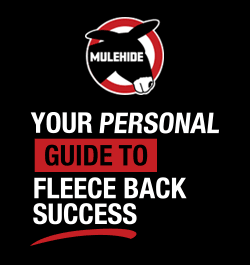











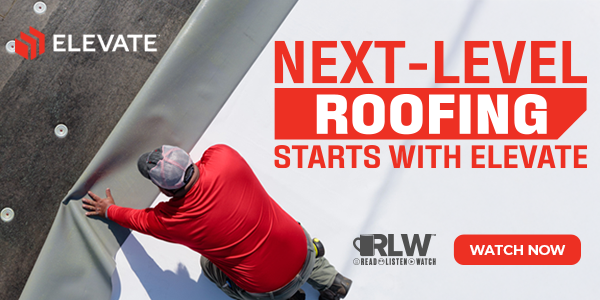
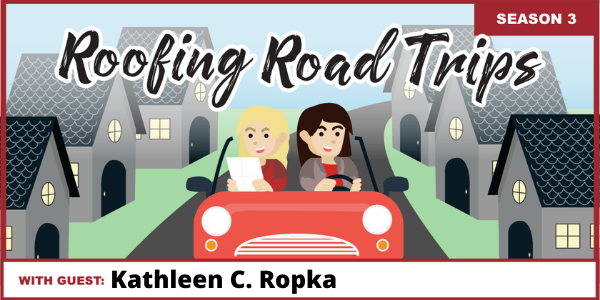
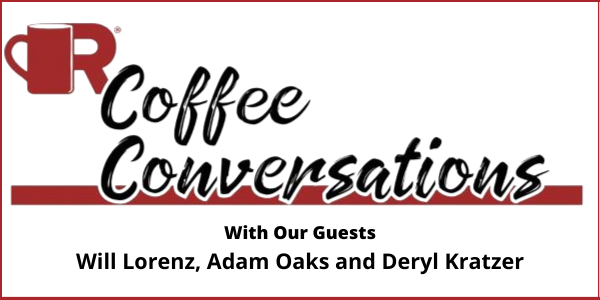
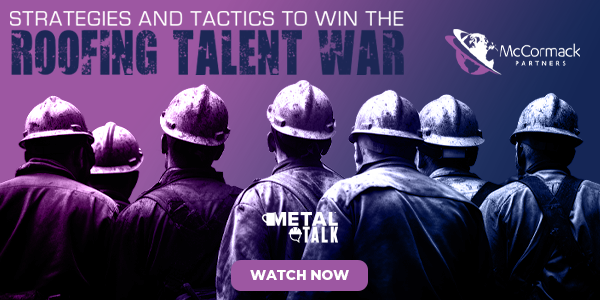


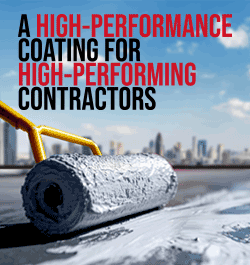


Comments
Leave a Reply
Have an account? Login to leave a comment!
Sign In